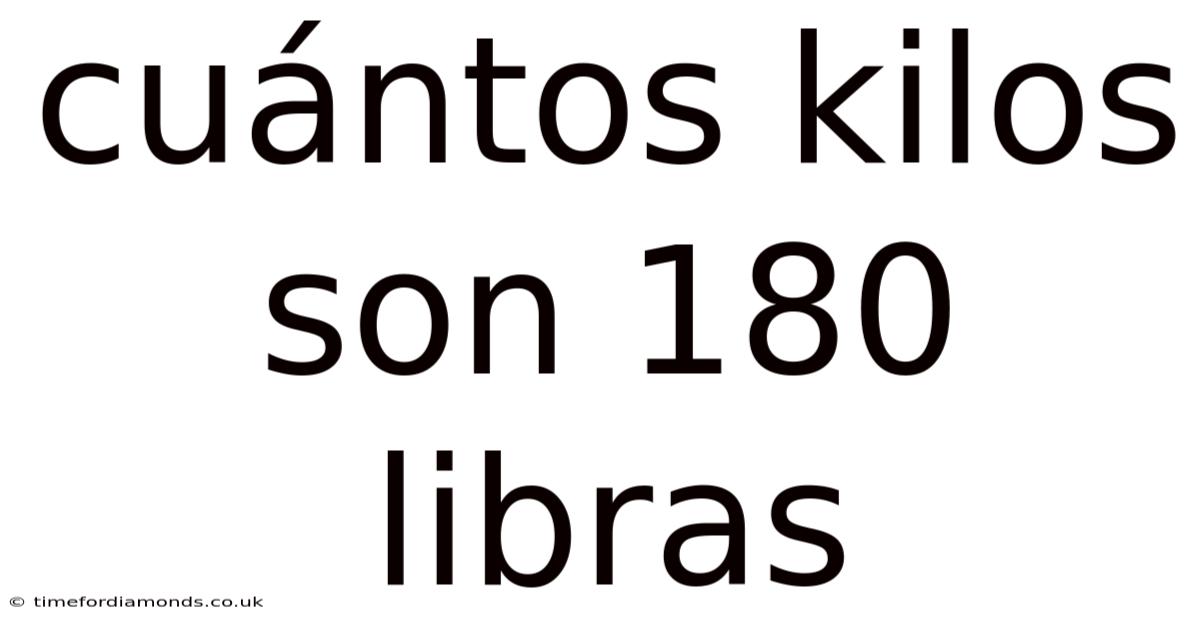Cuántos Kilos Son 180 Libras
timefordiamonds
Sep 23, 2025 · 4 min read

Table of Contents
How Many Kilograms are 180 Pounds? A Comprehensive Guide to Weight Conversion
Are you trying to understand weight conversions, perhaps for travel, cooking, or even fitness goals? Figuring out how many kilograms are in 180 pounds can seem confusing at first, but it's a straightforward calculation once you understand the process. This comprehensive guide will not only answer the question "Cuántos kilos son 180 libras?" but also explore the underlying concepts of weight conversion, provide helpful tips, and delve into some frequently asked questions. Let's dive in!
Understanding Weight and Measurement Systems
Before we get to the conversion, it's important to understand the different systems involved. We're dealing with two primary systems:
-
Pounds (lbs): This is a unit of weight in the imperial system, commonly used in the United States and a few other countries. One pound is approximately equal to 0.453592 kilograms.
-
Kilograms (kg): This is a unit of mass in the metric system, the most widely used system globally. It's based on the International System of Units (SI).
The difference between mass and weight is subtle but important. Mass is the amount of matter in an object, while weight is the force of gravity acting on that mass. In everyday use, the terms are often used interchangeably, especially in conversions like this.
Calculating Kilograms from Pounds
The conversion from pounds to kilograms is a simple multiplication. To find out how many kilograms are in 180 pounds, we use the conversion factor: 1 lb ≈ 0.453592 kg.
Therefore, the calculation is:
180 lbs * 0.453592 kg/lb ≈ 81.64656 kg
So, 180 pounds is approximately equal to 81.65 kilograms.
This answer directly addresses the question, "Cuántos kilos son 180 libras?" The answer is approximately 81.65 kilos.
Beyond the Calculation: A Deeper Dive into Conversions
While the calculation above is straightforward, understanding the underlying principles makes you more confident in your conversions and allows you to perform other similar calculations easily.
Using a Conversion Calculator: For quick and easy conversions, numerous online calculators are available. Simply input the value in pounds, and the calculator will provide the equivalent in kilograms. While convenient, understanding the manual process is essential for a deeper understanding.
Understanding Significant Figures: The precision of your answer depends on the number of significant figures you use. The conversion factor (0.453592) is very precise. However, for most practical purposes, rounding to 81.65 kg is sufficiently accurate.
Converting Other Units: The same principle applies when converting other units of weight or mass. For example, if you needed to convert ounces to grams, you'd use a different conversion factor.
Practical Applications of Weight Conversion
The ability to convert between pounds and kilograms is valuable in various situations:
-
International Travel: Understanding weight limits for luggage on airplanes often requires converting between pounds and kilograms.
-
Cooking and Baking: Many recipes use different units of measurement. Converting weight is crucial for accurate results.
-
Fitness and Health: Tracking weight loss or gain, understanding dietary recommendations, and using fitness equipment often requires conversions.
-
Shipping and Logistics: Calculating shipping costs and understanding weight restrictions for packages frequently involve conversions.
-
Scientific Research: Many scientific studies and experiments require precise measurements, often using the metric system.
Frequently Asked Questions (FAQs)
Here are some common questions regarding weight conversions:
Q: Is the conversion from pounds to kilograms always exact?
A: No, the conversion is an approximation. The exact conversion factor is 0.45359237, but rounding is often necessary for practical purposes.
Q: How do I convert kilograms back to pounds?
A: To convert kilograms back to pounds, simply divide the weight in kilograms by the conversion factor: 1 kg ≈ 2.20462 lbs.
Q: What is the difference between weight and mass?
A: Weight is the force of gravity acting on an object's mass. Mass is the amount of matter in an object. On Earth, they are often used interchangeably for everyday purposes, but in other contexts (like space travel), the distinction is crucial.
Q: Are there other units of weight I should be aware of?
A: Yes, several other units exist, including ounces, grams, stones, and tons. Understanding their relationships with pounds and kilograms can be helpful in various contexts.
Q: Why is the metric system preferred in scientific research?
A: The metric system's decimal-based nature makes calculations and conversions much simpler and more consistent than the imperial system. This consistency minimizes errors and facilitates communication among researchers worldwide.
Conclusion: Mastering Weight Conversions
Mastering weight conversions between pounds and kilograms is a valuable skill with diverse applications. Understanding the underlying principles, not just the calculation itself, empowers you to tackle conversions confidently and accurately. Whether you're planning a trip, following a recipe, or tracking your fitness progress, the ability to seamlessly switch between these units will streamline your efforts and improve your understanding of the world around you. Remember, 180 pounds is approximately 81.65 kilograms – a piece of information that can be incredibly useful in numerous aspects of life. Practice these conversions, and soon you'll find them second nature.
Latest Posts
Related Post
Thank you for visiting our website which covers about Cuántos Kilos Son 180 Libras . We hope the information provided has been useful to you. Feel free to contact us if you have any questions or need further assistance. See you next time and don't miss to bookmark.